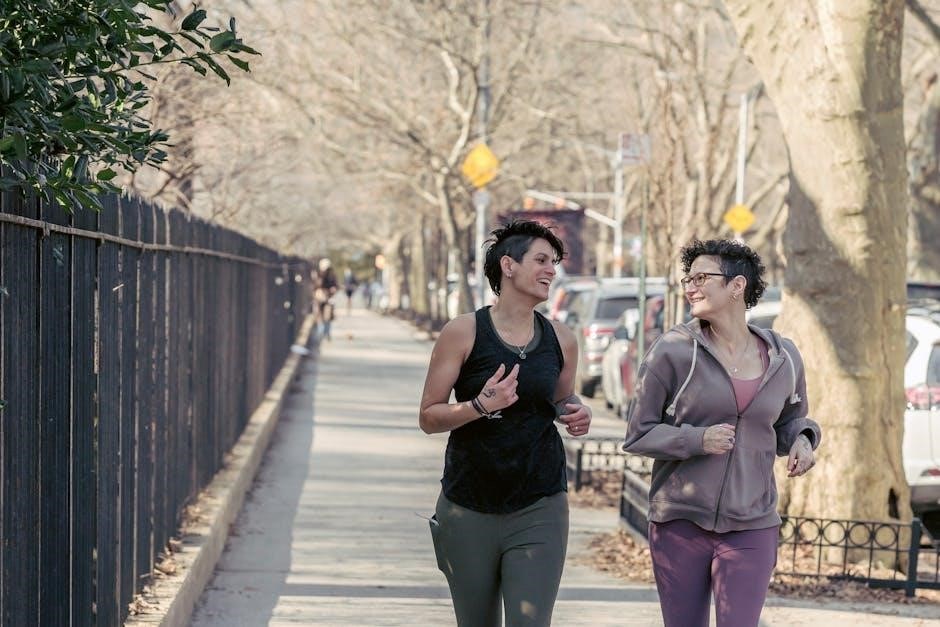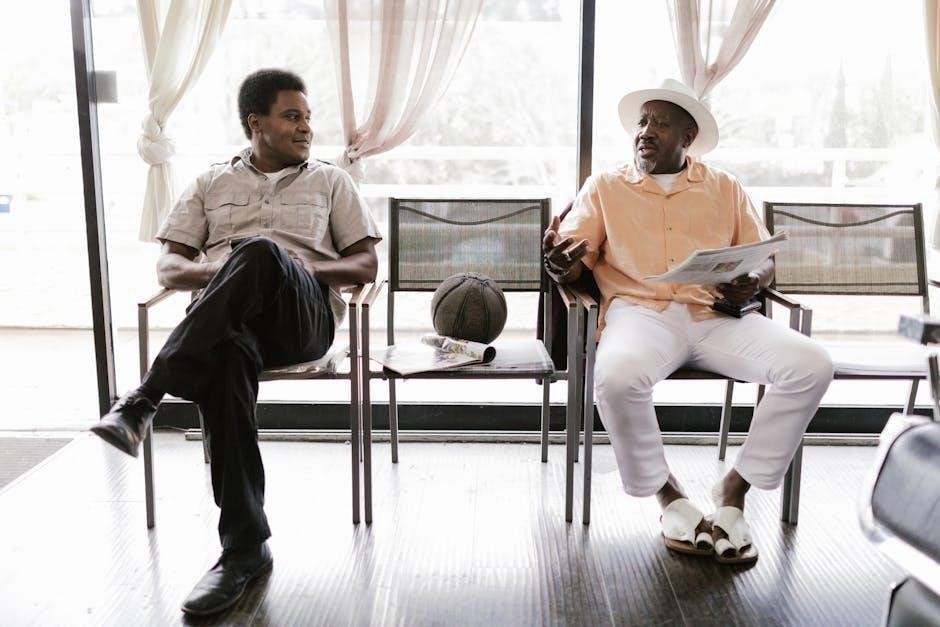
eassom 2005 sport and the social contract pdf
Eassom’s 2005 work explores how organized sports unify societies by aligning shared goals, values, and norms, fostering social cohesion and a collective identity.

1.1. Overview of the Concept of Social Contract in Sports
The social contract in sports, as explored by Eassom, refers to the implicit agreement among individuals and society to abide by shared rules and norms; Organized sports create a platform where participants and spectators collectively uphold values like fairness, respect, and teamwork. This mutual understanding fosters unity and cooperation, ensuring that sports function as a cohesive force within society. By adhering to these unwritten rules, sports promote social harmony and provide a framework for addressing inequalities and fostering integration. The concept underscores how sports reflect and reinforce societal values, making them a vital tool for maintaining social order and promoting collective goals.
1.2. Importance of Organized Sports in Society
Organized sports play a pivotal role in fostering social unity and ethical behavior, serving as a unifying force that transcends individual differences. They instill shared values such as teamwork, fairness, and respect, which are essential for societal well-being. By providing a structured environment for collective participation, sports help bridge social divides and promote integration among diverse groups. This collective engagement strengthens community bonds and reinforces a sense of shared identity, making organized sports a cornerstone of societal cohesion and a powerful tool for nurturing ethical and cooperative behavior.
1.3. Eassom’s Perspective on Sport and Social Unity
Eassom emphasizes that sport serves as a powerful tool for fostering social unity by creating shared experiences and common values. He argues that organized sports provide a platform where individuals from diverse backgrounds can unite under a shared purpose, transcending societal divisions. By promoting teamwork, mutual respect, and collective goals, sports strengthen social bonds and reinforce a sense of belonging. Eassom highlights how this shared engagement in sports cultivates a shared identity, making it a vital instrument for building and maintaining social harmony. His perspective underscores the role of sports in bridging gaps and fostering cooperation within society.

Historical Context of Sport as a Social Institution

Sport has historically been a cornerstone of community building, fostering unity and reflecting societal structures and values across generations, promoting social cohesion and cultural identity.

2.1. Evolution of Sport as a Tool for Social Cohesion
Sport has evolved as a powerful tool for fostering social cohesion, transcending cultural, racial, and socioeconomic divides. Ancient civilizations used sport to unite communities and celebrate shared identities. Over time, organized sports became platforms for collective expression, reinforcing societal values and norms. The modern era has seen sport play a pivotal role in bridging divides, promoting inclusivity, and strengthening social bonds. Through shared experiences, sport cultivates empathy and mutual understanding, serving as a universal language that connects people worldwide. Its enduring appeal lies in its ability to unite individuals, fostering a sense of belonging and collective purpose.
2.2. Historical Examples of Sport Promoting Social Unity
Throughout history, sport has served as a catalyst for social unity, bridging divides and fostering collective identity. The ancient Olympic Games exemplified this, uniting Greek city-states through shared competition and cultural exchange. Similarly, in the 20th century, events like the 1968 Olympics Black Power Salute highlighted sport’s role in addressing social issues and promoting equality. Nelson Mandela’s use of the 1995 Rugby World Cup to heal post-apartheid South Africa is another testament to sport’s unifying power. These examples illustrate how sport transcends individual differences, creating moments of shared purpose and solidarity that strengthen societal bonds.
2.3. The Role of Sport in Shaping Social Norms
Sport has long been a mirror and a shaper of societal norms, reflecting and influencing cultural values. It often serves as a platform for challenging and redefining social standards, promoting inclusivity and equality. For instance, the integration of African American athletes in professional leagues during the Civil Rights Movement symbolized broader societal change. Similarly, the rise of women’s sports has advanced gender equality, reshaping perceptions of female athleticism; Sport’s ability to evoke emotions and unite people makes it a powerful tool for driving social progress and normalizing diversity, thereby contributing to the evolution of cultural norms and values.

The Role of Sport in Promoting Social Contract
Sport fosters unity and shared objectives, creating a sense of collective identity and mutual responsibility, which are essential for strengthening the social contract within societies.
3.1. Sport as a Platform for Shared Goals and Objectives
Sport serves as a powerful platform for fostering shared goals and objectives, uniting individuals and groups under common purposes. By aligning personal and collective aspirations, sports create a sense of belonging and mutual commitment. Eassom highlights how this shared focus strengthens social bonds, enabling societies to work toward unified outcomes. The collaborative nature of sports, such as teamwork in football or collective efforts in community races, exemplifies how shared objectives transcend individual interests. This alignment of goals not only enhances social cohesion but also reinforces the idea of a collective identity, making sport a vital tool for nurturing societal unity and cooperation.
3.2. How Sport Fosters a Sense of Community
Sport plays a vital role in fostering a sense of community by creating shared experiences and emotional connections among individuals. Through participation in or support of sports, people develop a collective identity, strengthening social bonds. Local sports teams often become symbols of community pride, uniting residents through shared interests and rituals. Sporting events serve as gatherings where diverse groups come together, transcending social divides. This collective engagement fosters mutual understanding and cooperation, reinforcing the idea of community. Eassom emphasizes how sport’s inclusive nature breaks down barriers, creating a shared sense of belonging and unity among individuals from all walks of life.
3.3. The Impact of Sport on Social Integration
Sport significantly contributes to social integration by bridging divides among diverse groups. It provides a platform where individuals from various backgrounds can unite through shared experiences, fostering mutual respect and cooperation. The inclusive nature of sport helps break down barriers such as race, gender, and socioeconomic status, promoting equality and reducing marginalization. By encouraging collective participation and teamwork, sport cultivates a sense of belonging, which is essential for social cohesion. Eassom highlights how sport’s universal appeal allows it to transcend social differences, making it a powerful tool for integrating individuals into society and fostering a more harmonious community.

Challenges to the Social Contract in Sport
Sport faces challenges like inequality, commercialization, and power imbalances, which can undermine its role in fostering unity and social cohesion, affecting its contractual foundations.
4.1. Social Inequality and Access to Sports
Social inequality significantly impacts access to sports, with economic and societal barriers limiting participation for marginalized groups. Historical and systemic disparities perpetuate unequal opportunities, reinforcing social stratification. Discrimination based on race, gender, and class further exacerbates these challenges, creating divisions within communities. Such inequities undermine the social contract, as sports ideally serve as unifiers. Without addressing these issues, the potential of sport to foster unity and equality remains unrealized, leaving many excluded from its benefits. Ensuring equitable access is crucial for maintaining the social contract and promoting inclusivity in organized sports.
4.2. The Influence of Commercialization on Sports
The commercialization of sports has transformed it into a multibillion-dollar industry, often prioritizing profit over social unity. Sponsorships, media rights, and elite athlete endorsements dominate, creating a gap between professional and amateur sports. This shift has led to increased competition for resources, often marginalizing smaller communities. While commercialization boosts sport’s global reach, it risks undermining its role as a unifying force by favoring economic interests over inclusivity. The commodification of sports challenges the social contract by concentrating power and resources among a few, potentially excluding those without financial means. Balancing profitability with accessibility remains a critical challenge for modern sports.
4.3. The Role of Power Dynamics in Sports
Power dynamics in sports often create imbalances, influencing how resources and opportunities are distributed. Athletes, leagues, and sponsors hold significant power, sometimes at the expense of fairness and equality. This hierarchy can marginalize certain groups, undermining the social contract. For instance, commercial interests may prioritize elite athletes over grassroots development, exacerbating inequality. Additionally, decision-making bodies in sports frequently reflect existing societal power structures, perpetuating biases. Addressing these dynamics is crucial to ensuring sports remain a unifying force, fostering inclusivity and equitable participation for all. Balancing power to promote fair representation is essential for maintaining the social contract in sports.

Modern Issues in Sport and the Social Contract
Modern sport faces challenges like globalization, commercialization, and technological advancements, impacting its role in maintaining social unity and ethical standards, as discussed in Eassom’s 2005 analysis.
5.1. The Impact of Globalization on Sports
Globalization has transformed sports into a global spectacle, fostering cross-cultural exchange and uniting diverse audiences. However, it has also introduced challenges, such as the homogenization of local sports cultures and the influence of international commercial interests. Eassom’s analysis highlights how globalization creates opportunities for shared experiences but also risks undermining local traditions and exacerbating social inequalities. The integration of global markets and media has further amplified these dynamics, making sport a complex reflection of both unity and division in an interconnected world. Balancing globalization’s benefits and drawbacks remains critical for maintaining sport’s role in fostering social cohesion.
The media plays a pivotal role in shaping sports narratives, influencing public perception and societal values. Through selective storytelling, media outlets frame athletes and events, often emphasizing heroism or overcoming adversity. This narrative shaping can foster social unity by creating shared emotional experiences. However, it can also perpetuate biases and exclude marginalized voices. Eassom’s work underscores how media narratives reflect and influence the social contract, highlighting the need for balanced and inclusive storytelling to ensure sport’s role in promoting equity and understanding. Media’s power to shape perceptions remains a critical factor in sport’s social impact. Modern sports face ethical challenges that impact the social contract, such as doping, unequal revenue distribution, and athlete exploitation. Issues like player compensation, revenue fairness, and the exploitation of amateur athletes raise questions about justice and equality. The influence of technology, such as performance-enhancing tools, further complicates ethical debates. Eassom’s framework emphasizes the need for ethical standards to maintain trust and social cohesion. Addressing these issues is crucial for ensuring sport remains a unifying force, fostering integrity, and upholding the values central to the social contract. Ethical considerations are vital for sport’s continued role in society. Historical and modern examples illustrate sport’s role in shaping the social contract. The Olympics have long symbolized global unity, while events like the FIFA World Cup highlight both success and failure in fostering social cohesion. Eassom’s analysis includes case studies of how sport united post-apartheid South Africa and divided communities during political conflicts. These examples demonstrate how sport reflects and influences societal values, emphasizing its dual potential to unify and fracture societies. By examining these cases, Eassom underscores the importance of sport in maintaining or disrupting the social contract. These studies provide practical insights into sport’s societal impact. Sport has historically served as a powerful tool for fostering social unity and reinforcing the social contract. The 1995 Rugby World Cup in South Africa, for instance, united a nation emerging from apartheid. Nelson Mandela’s support for the Springboks symbolized reconciliation and shared identity. Similarly, the Olympics have consistently brought nations together, promoting peace and mutual respect. FIFA World Cup events have also showcased sport’s ability to transcend political and cultural divides, creating a sense of global community. These examples highlight how sport can bridge societal gaps and strengthen collective values, aligning with Eassom’s perspective on its unifying potential. Despite its potential, sport has sometimes failed to uphold the social contract, often due to underlying societal issues. Historical examples include the 1936 Berlin Olympics, where sport was exploited for political propaganda, deepening racial and political divides. Similarly, the 1982 South Africa rugby tour highlighted the persistence of apartheid, sparking global protests. Instances of hooliganism, such as the 1985 Heysel Stadium disaster, revealed how sport can perpetuate violence and division. These failures underscore the challenges sport faces in consistently fostering social unity and demonstrate how external factors can undermine its potential to strengthen the social contract. Lessons from historical and modern sport examples highlight the necessity of addressing societal issues to strengthen the social contract. Historical cases, like the exclusion of women in early Olympic Games, reveal the importance of inclusivity. Modern examples, such as the use of sport to bridge divides in post-conflict regions, demonstrate its rehabilitative potential. These lessons emphasize the need for ethical governance, inclusivity, and addressing inequality to ensure sport remains a unifying force. By learning from both successes and failures, sport can better serve as a platform for fostering social cohesion and upholding the social contract. The future of sport lies in embracing innovation, inclusivity, and ethical governance to strengthen societal bonds. Technology and globalization will shape its role in fostering unity and social cohesion. Emerging trends in sport include increased digital engagement, the rise of e-sports, and a focus on sustainability. These shifts reflect broader societal changes, such as technological advancement and environmental consciousness. Sport is also becoming more inclusive, with greater participation from diverse groups. Additionally, there is a growing emphasis on mental health and athlete well-being. These trends highlight how sport mirrors and influences societal evolution, creating new opportunities for social connection and unity. By adapting to these changes, sport can continue to play a vital role in fostering the social contract. Technology is revolutionizing sports, enhancing performance, and transforming fan engagement. Advances like virtual reality (VR), artificial intelligence (AI), and wearable devices are enabling athletes to train smarter and recover faster. Esports has emerged as a significant sector, blending technology and competition. Additionally, technology is improving accessibility, allowing people with disabilities to participate more fully. Data analytics is also playing a crucial role in strategy development and fan interaction. These innovations are reshaping the future of sports, creating new opportunities for social connection and redefining how sport contributes to the social contract. Technology’s impact is both transformative and enduring. To strengthen the social contract through sport, it is essential to promote inclusivity, equity, and accessibility. Policymakers should invest in grassroots programs that reach underserved communities, ensuring all individuals can participate. Education and awareness campaigns can combat discrimination and foster mutual respect. Additionally, leveraging technology to enhance engagement and transparency can build trust. Encouraging collaboration between governments, organizations, and communities will amplify positive impacts. By addressing systemic barriers and embracing diversity, sport can serve as a powerful tool for unity and social progress, reinforcing the social contract for future generations. These efforts will ensure sport remains a unifying force.5.2. The Role of Media in Shaping Sports Narratives
5.3. Ethical Considerations in Modern Sports
Case Studies and Examples

6.1. Successful Examples of Sport Promoting Social Contract
6.2. Failures in Sport and Social Contract
6.3. Lessons Learned from Historical and Modern Examples

The Future of Sport and the Social Contract
7.1. Emerging Trends in Sport and Society
7.2. The Role of Technology in Shaping Future Sports
7.3. Recommendations for Strengthening the Social Contract Through Sport